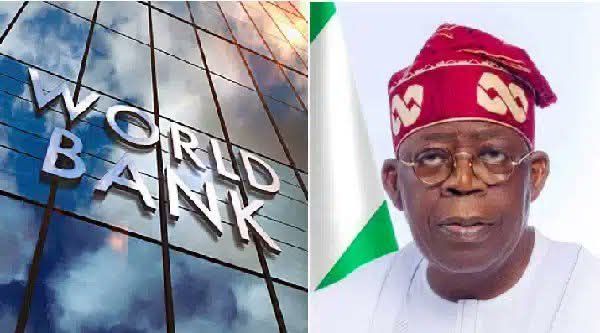The World Bank has commended President Bola Ahmed Tinubu for implementing reforms that have significantly improved Nigeria’s macroeconomic stability. This recognition was highlighted in the latest edition of the Nigeria Development Update (NDU) report, titled “Building Momentum for Inclusive Growth,” released in Abuja.
Economic Growth and Fiscal Improvements
According to the report, Nigeria’s economy grew by 4.6% year-on-year in Q4 2024, driving overall growth for the year to 3.4%—its highest since 2014, excluding the COVID-19 rebound period. The report also noted an improvement in Nigeria’s foreign exchange (FX) market and external financial position, with the fiscal deficit shrinking from 5.4% of GDP in 2023 to 3.0% of GDP in 2024.
Revenue generation played a pivotal role in this recovery, surging from ₦16.8 trillion in 2023 (7.2% of GDP) to an estimated ₦31.9 trillion in 2024 (11.5% of GDP).
Despite the improvements, inflation remains high, with projections indicating it will average 22.1% in 2025 as the government maintains a tight monetary policy to curb inflationary pressures.
Consolidating Stability and Driving Inclusive Growth
The World Bank emphasized the need to consolidate macroeconomic stability while pushing for inclusive growth through deeper structural reforms. The report called for:
•More and better job creation to tackle poverty.
•Infrastructure development to address gaps in electricity and transportation.
•Enhanced competition and market openness to spur business growth.
•Better access to finance for businesses to improve productivity.
Speaking on the report, Taimur Samad, Acting World Bank Country Director for Nigeria, noted:
“Nigeria has made impressive strides to restore macroeconomic stability… This is a historic opportunity to improve development spending on human capital, social protection, and infrastructure.”
The Path to a $1 Trillion Economy
The NDU report also outlined Nigeria’s ambition to achieve a $1 trillion economy by 2030. For this to happen, growth must accelerate and shift toward high-productivity sectors that create mass employment, especially for the economically insecure.
The Finance and ICT sectors are identified as key drivers of growth, though the report acknowledged that many Nigerians currently lack the skills to participate in these booming industries. To bridge this gap, the World Bank suggests a private sector-led, public sector-facilitated growth strategy.
Public Sector’s Role and Transparency Improvements
Alex Sienaert, World Bank Lead Economist for Nigeria, stated that the public sector should focus on providing essential services and enabling the private sector to innovate and drive growth. This strategic positioning is critical, given the limited capacity of public resources to independently generate jobs and growth.
Wale Edun, Minister of Finance and Coordinating Minister of the Economy, echoed this sentiment, highlighting improvements in transparency within the Nigerian National Petroleum Company Limited (NNPC Ltd). He emphasized ongoing forensic audits that would ensure states receive proper FAAC allocations.
CBN’s Commitment to Economic Stability
Central Bank of Nigeria (CBN) Governor, Olayemi Cardoso, assured stakeholders of the Apex Bank’s commitment to economic stability. He emphasized:
“We will continue to protect the economy… There is stability in the FX rate, and if we stay the course, inflation and interest rates should moderate.”
Cardoso also noted that the CBN’s resilience measures are diversifying Nigeria’s economy away from oil dependency, increasing transparency, and strengthening financial inclusion.
The World Bank’s recognition of Nigeria’s reforms is a notable endorsement of President Tinubu’s economic policies. The challenge remains to sustain momentum, drive inclusive growth, and reduce poverty, while positioning the nation to achieve its $1 trillion economy goal by 2030.

